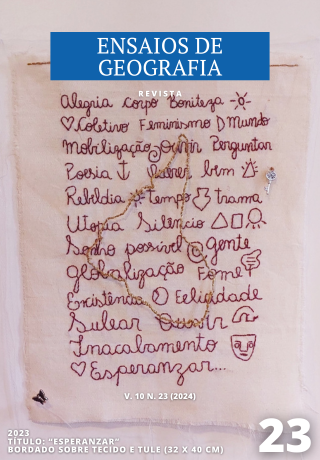Equity and Contextualization at BNCC
limits and possibilities for critical and citizenship education in Geography teaching
DOI:
https://doi.org/10.22409/eg.v10i23.61715Keywords:
Secondary Education, Educational practices, Dominant interests, Curriculum, ReproductionAbstract
This article analyzes the National Common Curricular Base (BNCC) and its impact on education, with an emphasis on the guidelines for Secondary Education aimed at the teaching of Geography. The qualitative research, supported by bibliographic and documentary sources, questions whether the proposed model may inadvertently perpetuate educational practices that reproduce social inequalities and serve the dominant interests of the bourgeois class, rather than promoting an education that genuinely transforms the society. The findings reveal that, despite the BNCC's emphasis on contextualization and curricular adaptability, it still imposes a restrictive model by enforcing a minimum curriculum that does not accommodate regional diversities and inequalities. It is concluded that, for education to be truly inclusive and transformative, curricula must be developed with the active participation of teachers, administrators, and communities, respecting local needs and realities in order to combat the reproduction of social inequalities.
Downloads
References
AGUIAR, M. A. da S. Relato da resistência à instituição da BNCC pelo Conselho Nacional de Educação mediante pedido de vista e declarações de votos. In: AGUIAR, Márcia Ângela da S; DOURADO, L. F. (Org). A BNCC na contramão do PNE 2014- 2024: avaliação e perspectivas. Recife: ANPAE, 2018.
BRASIL. Ministério da Educação. Base Nacional Comum Curricular. Brasília: MEC, 2018. Disponível em: http://basenacionalcomum.mec.gov.br/images/BNCC_EI_EF_110518_versaofinal_site.pdf. Acesso em: 15 jan. de 2024.
FREIRE, Paulo. Pedagogia do oprimido. 17ª ed. Rio de Janeiro: Paz e Terra, 1987.
GIROTTO, E. D. Dos PCNs a BNCC: o ensino de geografia sob o domínio neoliberal. Geo UERJ, Rio de Janeiro, n. 30, p. 419-439, 2017. Disponível em: doi:10.12957/geouerj.2017.23781. Acesso em: 12 jan. 2024.
LOPES, A. C. Itinerários formativos na BNCC do Ensino Médio: identificações
docentes e projetos de vida juvenis. Revista Retratos da Escola, Brasília, v. 13, n. 25, p. 59-75, jan./mai. 2019. Disponível em: http//www.esforce.org.br. Acesso em: 15 jan. 2024.
LUCKESI, C. C. Filosofia da Educação. São Paulo: Cortez, 1990.
NUNES, L. C. S. M. Por um ensino de geografia para além do reprodutivismo: sequência didática sobre classes sociais, desigualdade e cidadania. 2022. 135f. Dissertação (Mestrado em Geografia) – Universidade Federal do Rio Grande do Norte, Natal, 2022.
SANTOS, M. O Espaço do Cidadão. São Paulo: Editora da Universidade de São Paulo, 2014.
SAVIANI, D. Escola e democracia. Campinas: Autores Associados, 2013.
SOARES, F. P. A influência do Banco Mundial e da OCDE na educação básica no Brasil e no ensino de geografia. São Paulo, 2020. Disponível em: https://periodicos.ufsm.br/geografia/article/view/41843/html. Acesso em: 07 jan. 2024.
Published
How to Cite
Issue
Section
License
Copyright (c) 2024 Da Revista (Ensaios de Geografia) e do Autor

This work is licensed under a Creative Commons Attribution 4.0 International License.
CC BY Attribution. Others may distribute, remix, transform, and build upon the material for any purpose, even commercially, provided they give the author and licensor the credits.


